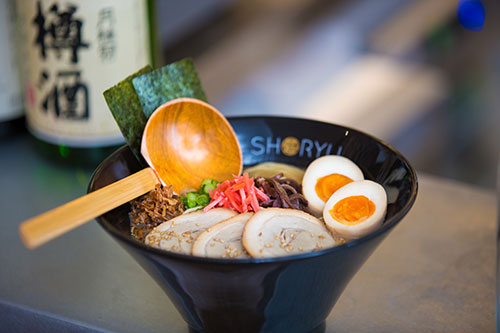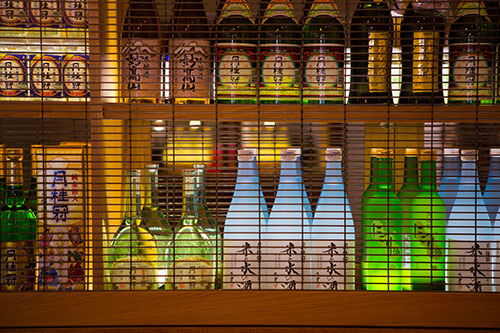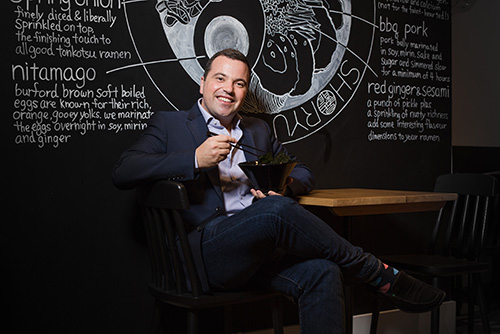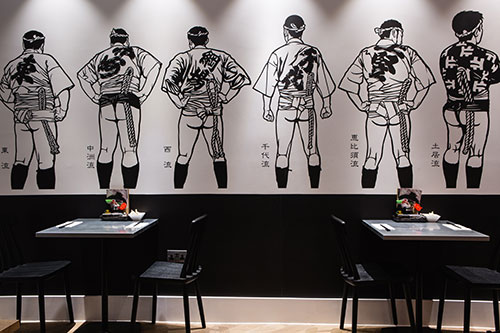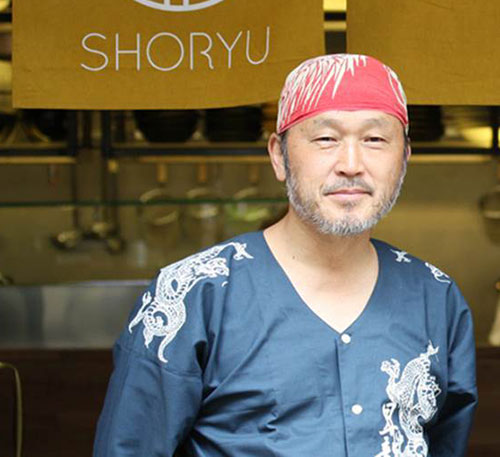Super noodles: the Shoryu Ramen story
The Japan Centre has provided a focus for East-Asian culture in London for 40 years, and now its group-owned Shoryu Ramen restaurants are set to open across the UK. James Stagg meets Emmett Loughran, the man tasked with spreading the ramen revolution
It must be somewhat frustrating for the man responsible for rolling out Shoryu Ramen that deals can only be signed in conjunction with a new moon. But such is the commitment to authenticity at the business that its chief operating officer, Emmett Loughran, is happy to accept this dedication to Japanese tradition as part of his brief.
Tokumine's exacting standards were what appealed to Loughran, who served his apprenticeship at Pret A Manger, rising up the ranks of the then-fledgling business before helping develop John Lewis's food halls. He met Tokumine while researching ramen in preparation for a proposed role at Wagamama and was seduced by his straightforward approach and determination to share Japan's cultural originality. He joined the business in early 2015.
"The thing is, he's honest, he's open, he's blunt as anything… but you really know where you are with the guy," Loughran explains. "Working for Tak was my number one reason for joining. Number two was the food. He understands the product and the potential."
Loughran's background in retail and rapid roll-outs suits the Japan Centre Group, which now encompasses a new Japan Centre, set to open on Panton Street near London's Leicester Square later this year, as well as seven Shoryu Ramen sites in London along with udon restaurant Ichyru. In addition, the first Shoryu Ramen outside London is set to open in Manchester, and there will be a Shoreditch site early next year. The group is also partnering with two-Michelin-starred chef Mitsuhiro Araki and sake manufacturer Gekkeikan on a new restaurant on London's Heddon Street (see panel).
So it's been a busy few years since the first Shoryu Ramen opened in 2012. The restaurants specialise in tonkotsu ramen, which hails from Hakata in Japan - birthplace of executive chef Kanji Furukawa and part of the Fukuoka prefecture, where Tokumine was born - as well as being the birthplace of shoryu buns. At the base of the ramen is an umami-rich pork broth, created by boiling pork bits for 12 hours to intensify the flavour and release the collagen, fat, marrow and calcium before combining the stock with motodare - a concentrated base of soy and spices.
Added to the soup are thin, straight wheat noodles and a variety of toppings, including char sui barbecue pork, which is marinated and slow-simmered for four hours in soy, mirin, sake and sugar, and soft-boiled Burford Brown eggs, which are marinated overnight in a similar mix.
The preparation is as close to traditional methods as possible, though some dishes have had to be toned down. "The Karaka Tan Tan Tonkotsu ramen is a special sauce we make that has to ferment for 24 hours," Loughran says. "We're actually on the verge of breaking health and safety law with that sauce - in Japan they leave it out for a whole week."
Each Shoryu Ramen site has a similar menu, with small tweaks both in terms of pricing and dish design depending on location. For example, the Covent Garden site features a Truffle Tonkotsu (£18). No matter which variation, eating it can be a messy affair, so diners are offered bibs. It's not unusual to see a the Liverpool Street restaurant full of businessmen slurping slippery noodles with plastic protection over their shirts. Meanwhile, diners are greeted and bid farewell by staff banging a drum.
"We always try and bring something traditional from Fukuoka to each restaurant," Loughran adds. "Design-wise, we try different things in different restaurants. In Liverpool Street we have the robata grill, so diners can see the fire and the cooking as soon as they walk in. There is rice in the walls, which goes back to Japanese zen. They use stone, wood and rice to symbolise the earth and it's something we try to keep in all our designs."
Now the concept has been proven in London, Loughran is ready to take it outside the capital, with Manchester set to open in November and in Oxford next year. He's targeting a further three openings in 2017 for Shoryu Ramen and two for Ichiryu, and remains keen for more sites in London, but only at realistic rents. There is even talk of opening in New York.
"Rents are extremely high in London at the moment, which is why we have to explore outside the capital," he says. "We're also looking at Birmingham and Edinburgh, but we need to get Manchester right first.
"London is so aggressive. Sites are going for £400,000, which is stupid money. We're going to slowly grow. We like Shoreditch, Soho and Brixton-type locations."
He appreciates that lessons will be learned in Manchester that will inform further openings across the country, so he is prepared to take some time on it. His team, he says, had identified a site they were keen to sign in Birmingham, but with the other opening so close, Loughran put the brakes on to ensure ample attention was paid to Manchester.
Emmett Loughran
"Social media has been going mental. There's potential up there. We'll probably have to change things as we go, but I think it's definitely worth it," he says.
In addition, Loughran is searching for more sites for Ichiryu, which specialises in udon - a noodle-based bowl, lighter than ramen, with 200 calories in the daintiest dish that features fish stock rather than pork broth.
"There are few places doing udon in London," he explains. "There was Koya in Soho, but that's now closed. We'd like to do another one. It is very much in its infancy, so we're changing the menu and tweaking bits. The area of the first site - New Oxford Street - is being redeveloped because of Crossrail, so we're waiting for that to kick in. It takes time, but we're happy with the first six months."
As both brands expand, their relationship with Japan Centre will mean that authenticity won't be compromised thanks to the huge amount of products it is capable of importing and storing at its warehouse and central kitchen in Acton.
Loughran says: "Japan Centre is important for us as we import from Japan with containers coming in every week. We are wholesalers, we have an online store and the shop. So we have different arms to the business. Japan Centre really is the core to what we're doing - without that base we wouldn't be able to do what we're doing in terms of authenticity."
And buying power is significant, with turnover at Japan Centre Group now standing at £25m and restaurants contributing 40%. Growth stands at around 15% year on year, thanks to the new openings. The group is approaching being a big player, but no matter how large it becomes there's no doubt Tokumine will maintain a tight control on quality and the overall experience.
"We can see our decisions immediately making a difference, but in a big business it takes much longer," Loughran says. "We want to maintain and hold onto that. That's why Tak is in every element of the business."
He recounts a research trip to Japan with Tokumine, before which the pair ate sushi at a Michelin-starred restaurant in London. "We then sat down in the fishmarket in Tokyo and the quality was actually better," Loughran explains. "He knew he was taking me to the cheapest place in Tokyo, but it was amazing. He was pointing out that it's possible to get this type of quality at an affordable price."
And if authenticity and affordability remain aligned - along with the moon - then Loughran looks likely to continue the march of the ramen revolution across the country.
The Japan Centre Group at a glance
Turnover £25m
Restaurant contribution £10m
Growth 15% year on year
Japan Centre food hall and book shop Currently on Shaftesbury Avenue, moving to Panton Street, London
Shoryu Ramen Carnaby Street, Covent Garden, Liverpool Street, Regent Street, Soho and Shoryu Go (Air Street, London)
Ichiryu New Oxford Street, London
Sakagura and the food of Japan
The roll out of Shoryu Ramen and Ichiryu aren't the only responsibilities on Loughran's plate. He's also involved in the creation of Sakagura, a joint venture between the Japan Centre Group, sake manufacturer Gekkeikan, the Toridoll Corporation and two-Michelin-starred Edomae Sushi restaurant, the Araki.
"It'll be a one-off and let's see where it goes. It's a completely different ball game," Loughran says.
"We're partnering with Araki, who will come in and do a dish seasonally. His daughter was studying in the UK so he came over, opened a restaurant and in a year was awarded two Michelin stars."
The menu, created along with Shoryu Ramen executive chef Kanji Furukawa, will be based on southern Japanese recipes, or 'washoku', meaning "the food of Japan".
Dishes will include Hakata yakitori (grilled skewers), hand-made udon and soba noodles, and freshly made sushi.
"Manager-wise, we're using Tak's niece to lead the restaurant and build a team around her," Loughran adds. "I see us up there with the likes of Zuma, Roka and Sake No Hana."
The robata grill will be visible from the dining area in the open-plan kitchen, while customers can either sit in booths or at the traditional wooden kappo counter to observe the chefs preparing each dish.
Japan Centre at 40
Tak Tokumine established the Japan Centre in 1976 with an ambition to create a food hall that celebrated Japan's culture and produce. It has been located in a number of London sites over the years, but is about to settle on Panton Street near Leicester Square - its biggest site.
"It's going to be like Eataly in New York, only Japanese-style," Loughran says. "With my background displays it will be more theatrical - we're going to have a sake room, tea room, miso room and a bakery. It will be our home for the next 20 years."
Tak Tokumine
Japan Centre's recruitment arm based in Japan means that talent can be spotted and, where possible, hired.
"We still try to recruit as many people with Japanese experience as possible," Loughran adds. "We have our own recruitment agency that looks for us, and we have a base in Fukuoka in Japan, but we always struggle for Japanese staff.
"It's not easy to bring people over. Since the Conservatives came in it's harder too. Some 80% of our team are European, so we have to be clever about recruitment."
From wraps to ramen
Emmett Loughran came to London at 16 from Ireland and started working for what he describes as "a small company called Pret with four restaurants" along with his brother and sisters.
Staying for 15 years, Loughran worked his way up to area manager and operations. "I decided in 2005 to take a year out and do a masters," he explains. "After that Pret asked me to come back and help with the US, which was failing. So I joined a hit squad that went over to New York. We put a little structure behind it and started making money.
"My job was going to be to roll it out in Washington DC and Chicago, but then I got married and my wife wanted to move closer to home."
Returning to the UK, he originally planned to stick with Pret or go to Itsu, where his brother Gerard was by this time chief executive, but instead joined John Lewis to help set up its food halls after a brief stint at Whole Foods Market.
"At the same time I was approached by Wagamama and was tempted, so went to do some research into ramen. That led me to Tak in his first restaurant, Shoryu," Loughran explains.
"He saw me taking an interest in the restaurant and asked: 'What are you doing here? I see you looking around, being nosey.' I told him I was considering an offer from Wagamama, and he asked: 'Why are you going with them?' And he gave me a lesson in quality and authenticity in Japanese food and ramen. It sparked an interest and got me thinking that this guy knows what he's doing."



